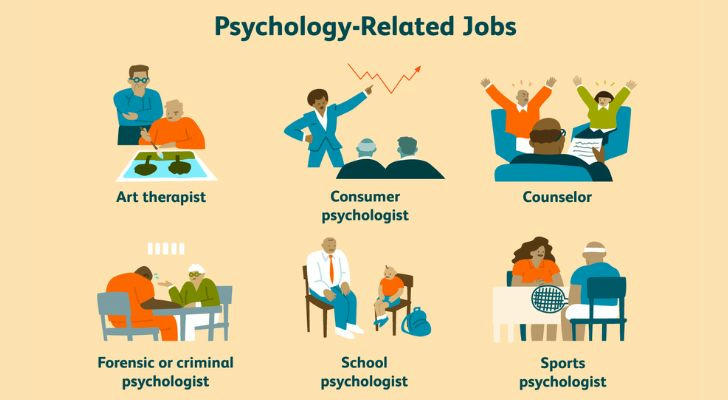Psych Grads Earn 27% More! How to Turn Mind Science into a 6-Figure Career
Introduction
Did you know psychology graduates can earn 27% more than the average graduate? A psychology degree isn’t just about understanding the human mind—it’s a gateway to high-paying careers in fields like tech, business, and mental health. Whether you’re drawn to helping others, solving complex problems, or analyzing data, your degree can open doors to a lucrative future. Let’s explore how you can turn your psychology background into a 6-figure career, step by step.

Why Psychology Graduates Are in Demand
Psychology graduates bring unique skills to the table, making them valuable across industries. Here’s why they’re in high demand:
Versatile Skill Set: Skills like critical thinking, communication, and data analysis are applicable in almost any field.
Rising Mental Health Needs: The growing focus on mental health has created opportunities in counseling, therapy, and wellness.
Corporate Roles: Companies are hiring psychology grads for HR, marketing, and organizational development.
Tech Opportunities: Fields like UX research, AI ethics, and human-computer interaction are booming.
With the right approach, you can turn these opportunities into a high-paying career.
Top High-Paying Careers for Psychology Graduates
Here are some of the best-paying roles for psychology graduates:
Clinical Psychologist: Median salary of $90,000+. Requires advanced degrees and licensure.
Industrial-Organizational Psychologist: Median salary of $120,000+. Focuses on improving workplace productivity and culture.
UX Researcher: Median salary of $95,000+. Uses psychology to design better tech products.
Neuropsychologist: Median salary of $110,000+. Studies the relationship between the brain and behavior.
Marketing Research Analyst: Median salary of $85,000+. Applies psychological insights to understand consumer behavior.

How to Turn Your Psychology Degree into a 6-Figure Career
Turning your degree into a high-paying career takes planning and action. Here’s how to get started:
Step 1: Figure Out What You Love
Ask yourself: Do you enjoy working directly with people, analyzing data, or solving organizational problems?
Match your interests to high-demand fields. For example, if you love tech, consider UX research.
Step 2: Get the Right Credentials
Advanced Degrees: A master’s or PhD is often required for clinical or research roles.
Certifications: Boost your resume with certifications in areas like UX design, data analysis, or organizational psychology.
Step 3: Gain Hands-On Experience
Look for internships, volunteer opportunities, or entry-level jobs in your chosen field.
Build a portfolio to showcase your work (e.g., case studies for UX research or therapy outcomes for clinical roles).
Step 4: Build Your Network
Join professional groups like the American Psychological Association (APA).
Attend industry events to meet people and learn about job openings.
Step 5: Highlight Your Skills
Emphasize transferable skills like data analysis, communication, and problem-solving in your resume.
Tailor your application to match the needs of your target industry.
Affordable Programs to Boost Your Career
Here are some programs to help you get ahead without breaking the bank:
Online Master’s Programs
University of Southern California (USC) – Master of Science in Applied Psychology ($45,000).
Penn State World Campus – Master of Professional Studies in Psychology of Leadership ($25,000).
Certifications
Google UX Design Professional Certificate ($39/month on Coursera).
Society for Industrial and Organizational Psychology (SIOP) Certification ($500-$1,000).

Success Stories: Real People, Real Results
Here’s how psychology graduates turned their degrees into high-paying careers:
1. Emily’s Journey: From Psych Grad to UX Researcher
Emily loved understanding human behavior but wasn’t sure how to apply it. After earning a UX certification, she landed a job at a tech company, earning $110,000/year.
“My psychology background gave me a unique edge in understanding user behavior,” Emily says. “The certification helped me break into tech.”
2. James’s Story: From Counselor to Organizational Psychologist
James worked as a counselor but wanted a change. He pursued a master’s in industrial-organizational psychology and now consults for Fortune 500 companies, earning $130,000/year.
“Switching to organizational psychology was the best decision I ever made,” James says. “I love helping companies improve their workplace culture.”
3. Laura’s Transformation: From Researcher to Neuropsychologist
Laura completed a PhD in neuropsychology and now works in a hospital, earning $120,000/year.
“Neuropsychology combines my love of science and helping others,” Laura says. “It’s challenging but incredibly rewarding.”
Challenges and How to Overcome Them
Pursuing a high-paying career in psychology isn’t always easy. Here’s how to tackle common challenges:
Cost of Advanced Degrees: Look for scholarships, assistantships, or employer-sponsored programs.
Competitive Job Market: Build a strong network and gain relevant experience early.
Licensing Requirements: Research state-specific requirements for clinical roles.
Conclusion: Your Path to a 6-Figure Career Starts Now
A psychology degree is more than just a pathway to understanding the human mind—it’s a gateway to a high-paying, fulfilling career. By identifying your goals, pursuing the right education, and gaining practical experience, you can turn your passion into a thriving profession.
Don’t wait. Start your journey today and unlock the potential of your psychology degree!
Additional Resources
Professional Organizations:
Scholarships and Financial Aid:
